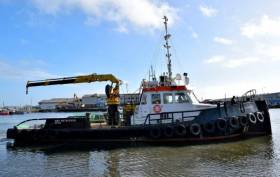Displaying items by tag: Oriel Wind Farm
ESB Says It ‘Remains Committed’ to Oriel Wind Farm After Missing Out in Offshore Energy Auction
The ESB says it “remains committed” to the Oriel Wind Farm project after it was unsuccessful in yesterday’s offshore wind energy auction, as RTÉ News reports.
The proposed wind power array in Dundalk Bay — a partnership between the ESB and Belgian green energy supplier Parkwind — missed out on one of the four contracts awarded to offshore wind projects around the country in the State’s first such auction.
In a statement on Friday (12 May), the ESB said that “while the Oriel project was not awarded a contract in this auction round, Parkwind and ESB believe that it is a well-positioned project and will ultimately play its part in generating the renewable electricity we need. We will continue to progress the project and are actively investigating alternative routes to market.”
Environment Minister Eamon Ryan confirmed on this morning’s edition of RTÉ Radio 1’s Today programme that there will be “a second auction later this year and we will go on the same next year”.
Meanwhile, environmentalists have urged that Ireland must be “wise”, despite the huge potential of green offshore energy, and maintain an “open transparency approach” when it comes to monitoring the status of marine wildlife around such sites.
RTÉ News has more on the story HERE.
Ultra-High-Resolution Geophysical Survey in Irish Sea Off Co Louth for Oriel Wind Farm
An ultra-high-resolution geophysical survey will be carried out in the Oriel Wind Farm array area in the Irish Sea off Co Louth to provide bathymetric and subsurface information to facilitate the development of the offshore wind farm.
The survey work was anticipated to start Friday 18 November 2022 and to be completed by mid-December 2022, subject to weather and operational constraints.
Works will be confined to the Oriel Wind Farm array area, which is located between Dunany Point and the Cooley Peninsula.
The survey will be conducted by the Fastnet Pelican (callsign 2FNX7), which is a shallow draft survey vessel. The vessel will be restricted in its ability to manoeuvre due to the deployment of towed survey equipment up to 100 metres astern.
All other vessels operating within this area are requested to leave a wide berth.
The work vessel will display appropriate lights and signals and operations will be conducted during daylight hours. Mariners are advised to keep continuous watch on VHF Channel 16 when navigating the area.
Coordinates and a map of the survey area as well as contact details can be found in Marine Notice No 78 of 2022, attached below.
Uncrewed Vessel Trials in Dundalk Bay Ahead of Oriel Wind Farm Survey
Trial operations of remotely piloted uncrewed surface vessels (USVs) are planned to take place in the Dundalk Bay area from this week until mid November.
Subject to weather and operational constraints, the operations will run for a period of four weeks from Thursday 20 October.
The XO-450-type USVs from Greenore-based Xocean will be engaged in survey activities for the proposed Oriel Wind Farm in the Irish Sea some 22km off the coast of Dundalk in Co Louth.
This is a non-invasive survey, Xocean says, and no contact with the seabed or any other infrastructure is planned during survey operations.
The USVs will send real-time images and situational awareness data over satellite to a team of operators keeping watch and controlling the vessel remotely 24/7.
Although the vessels are uncrewed, they are constantly monitored and controlled, and piloted remotely using 360-degree cameras and other navigational aids.
Each USV is equipped with AIS, navigation lights and a sound signal, an active radar reflector and a yellow-painted superstructure to make it conspicuous to other marine traffic.
All other vessels operating within the affected area are requested to avoid contact with any USV and be aware of the operational area during this period. A Radio Navigation Warning will be in place during operations.
Contact details, relevant coordinates and a map of the survey area are included in Marine Notice No 71 of 2022, attached below.
Geophysical surveys are being undertaken in the Irish Sea in outer Dundalk Bay from this week.
The work is required to provide bathymetric and subsurface information for the development of the Oriel Wind Farm project.
Survey work was expected to start yesterday, Tuesday 20 August, with a view to completion by Monday 30 September, though these dates are weather dependent.
The surveys will be completed using the AMS Retriever (Callsign MEHI8), a versatile multi-purpose, shallow draft tug.
This vessel is towing survey equipment up to 100 metres astern and will be restricted in its ability to manoeuvre.
Other vessels are requested to leave a wide berth. The AMS Retriever will be operating from approximately 6am to 9pm during survey works.
Details of co-ordinates of the survey area are included in Marine Notice No 29 of 2019, a PDF of which is available to read or download HERE.





























































